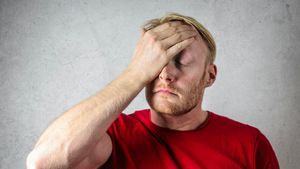YOGYAKARTA Psychological conditions and physical health affect each other. The more psychologically healthy, the more physically likely it is to be healthier. Recent research published in the journal Neurology, a researcher from Galway University, Ireland, shows that people with 46 percent depression symptoms are likely to have a more stroke.
The study involved 26,877 adult-age participants from 32 countries in Europe, Asia, North and South America, the Middle East, and Africa. According to neuroscientist Dustin Hines, Ph.D., this study explores understanding of stroke and depression. Researchers report that 18 percent of the 13,000 participants who had a stroke experienced symptoms of depression. Among those who do not suffer from stroke, the prevalence of depression is 14 percent.
In the study, participants were asked about a history of depression in the 12 months before stroke. Including feelings of sadness, blueness, or depression for two weeks or more consecutively. The more symptoms of depression that participants report, the higher the risk of stroke. For example, those who report five or more symptoms of depression have a 54% higher risk of stroke than those who do not experience symptoms of depression, the researchers said.
People who are depressed tend not to take good care of themselves physically or emotionally. They tend to ignore medical health, do not eat and sleep well, and are inconsistent in taking medication.
In addition, people suffering from depression also have a bad result one month after suffering a stroke compared to those who are not depressed. This finding was supported by Megan Tangradi's statement, clinical director of a New Jersey-based mental health and addiction program reported by Healthline, Wednesday, June 5. Obviously, Tangradi, the fact is that depression is related to physiological changes such as increased inflammation and dysregulation of the autonomous nervous system which has a negative impact on stroke recovery.
SEE ALSO:
Physical limitations of stroke sufferers, in addition to potential cognitive and speech deficits, have a negative impact on stroke patients and loved ones around them. If a person experiences depression and stroke, this has a negative impact on his will or determination to be fully involved in the rehabilitation process. This can hinder recovery from stroke and result in worse results.
The symptoms of depression include overall physical, emotional, and cognitive symptoms. It would be helpful to understand specific items about what correlates strongly with the risk of stroke, "explained Karen Sullivan, Ph.D. who is a neuropsychologist.
Sullivan also suggested that health care providers and the public are important to screen for depression. Especially for stroke sufferers. For research conducted by doctor Robert Murphy, Sullivan recommends long-term research to find a causal relationship between depression and stroke more deeply. Large-scale research is also needed to find out which treatment can be successful in reducing the risk of stroke for people with symptoms of depression.
The English, Chinese, Japanese, Arabic, and French versions are automatically generated by the AI. So there may still be inaccuracies in translating, please always see Indonesian as our main language. (system supported by DigitalSiber.id)
















